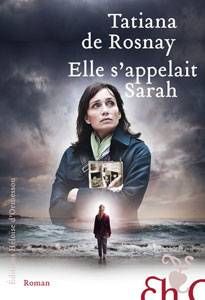 |
Elle s'appelait SarahElle s’appelait Sarah Paris, juillet 1942. Lorsque la police française fait irruption dans leur appartement en pleine nuit, Sarah enferme son petit frère dans un placard et emporte la clé, persuadée qu’elle reviendra le libérer très vite. Mais elle fait partie des milliers de juifs arrêtés lors de la rafle du Vel d’Hiv. Paris, mai 2002. Soixante ans plus tard, Julia Jarmond, journaliste d'investigation, retrouve sa trace. Dès lors, le visage de la petite fille ne la quitte plus. Contre l'avis de son mari – dont la famille cache un terrible secret, elle veut à tout prix savoir ce qu’il lui est arrivé. Dans ce magnifique roman, Tatiana de Rosnay évoque avec une intense émotion l’une des pages les plus sombres de l’histoire de la France et contribue à sa manière au devoir de mémoire. Elle s’appelait Sarah a été traduit dans plus de quarante pays et vendu à plus de 9 millions d’exemplaires dans le monde. Le roman a été adapté au cinéma en 2010 par Gilles Paquet-Brenner, avec Kristin Scott Thomas (Julia) et Mélusine Mayance (Sarah). Éditions Héloïse d’Ormesson, 2007. Le Livre de Poche, 2008. |
 |
Sarah's KeyParis, July 1942: Sarah, a ten year-old girl, is brutally arrested with her family by the French police in the Vel' d'Hiv' roundup, but not before she locks her younger brother in a cupboard in the family's apartment, thinking that she will be back within a few hours. Paris, May 2002: On Vel' d'Hiv's 60th anniversary, journalist Julia Jarmond is asked to write an article about this black day in France's past. Through her contemporary investigation, she stumbles onto a trail of long-hidden family secrets that connect her to Sarah. Julia finds herself compelled to retrace the girl's ordeal, from that terrible term in the Vel d'Hiv', to the camps, and beyond. As she probes into Sarah's past, she begins to question her own place in France, and to reevaluate her marriage and her life. Tatiana de Rosnay offers us a brilliantly subtle, compelling portrait of France under occupation and reveals the taboos and silence that surround this painful episode. St. Martin's Paperbacks, 2016. McMillan |
Copyright ©
2024
Tatiana de Rosnay - crédit photo Charlotte Jolly de Rosnay
